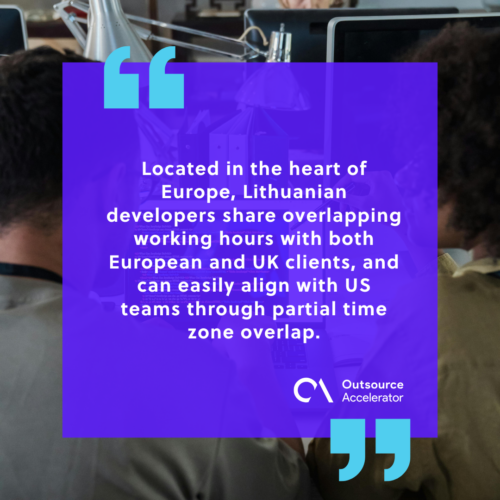Why you should hire offshore tech developers from Lithuania

Looking to scale your tech team without scaling your budget? The answer might be in the Baltics.
Lithuania has rapidly emerged as a new destination for tech offshoring, offering a unique blend of highly skilled developers, strong English proficiency, and a thriving innovation ecosystem. It’s not just a cost-saving measure, but a strategic move that provides access to world-class talent and a work culture that aligns seamlessly with Western markets.
And as Max Golikov, Chief Business Development Officer of Sigli, puts it in the 555th episode of the Outsource Accelerator Podcast, “Our focus is on delivering high quality software solutions for our clients all over Europe.”
So why exactly should you consider offshore tech developers from Lithuania? Let’s take a closer look.
Lithuania’s robust tech scene
Lithuania has quietly built one of the most resilient and innovative tech sectors in Europe. After the fall of the Soviet Union, the country invested heavily in infrastructure, education, and integration with the European Union. The results speak for themselves.
“There’s a very developed level of connectivity, which is very important for tech. We have great internet, great infrastructure for innovation, [and] also strong connections at the university level,” Max explained.

This means companies that hire offshore tech developers from Lithuania gain access to engineers who are not only technically skilled but also plugged into the latest industry developments.
Vilnius, the capital, has become a vibrant hub for international startups, fintech firms, and software outsourcing providers, being named a rising tech hub. The city is small enough to feel connected yet global enough to attract diverse talent.
And the best part? You’re never far away.
“You’re probably two hours away from most European capitals by plane, [and] that creates a great environment, a very international, very developed society eager to contribute,” Max said.
Key advantages of hiring offshore tech developers from Lithuania
Tapping into Lithuania’s tech talent offers a strategic advantage for businesses seeking to expand their development capabilities.
1. Strong technical expertise and education
Lithuanian developers are known for their engineering-first mindset. Max emphasized this point: “Our focus from the very beginning of the company has been on engineering staff, and we have always tried to cultivate that engineering mindset and engineers as a whole.”
At Sigli, every developer has a mentor—not a manager, but a guide to help them refine skills and grow professionally.
“Everybody, regardless of their level or experience, has that sort of person assigned to them, and they work together a lot of the time,” Max explained.
This culture of learning ensures teams stay sharp in a field where technologies evolve at breakneck speed.
Tech.eu reported that Lithuanian tech companies raised almost €600 million in 2024, as well as raised the ecosystem’s valuation past €16 billion, resulting in a 39x growth within the decade.
2. Multilingual and culturally compatible workforce
Lithuania’s workforce stands out not only for its technical skills but also for its communication abilities.
English proficiency is widespread, and many professionals have studied or worked abroad. For clients, this means fewer misunderstandings, smoother collaboration, and teams that integrate seamlessly with existing staff.
3. Competitive costs with high value
While not the cheapest option globally, offshore tech developers in Lithuania strike a sweet spot between cost and quality.
“Our hourly rates [are] not cheap, definitely, but what we are trying to give is flexibility and quality,” Max said.
Companies can avoid the overhead of recruitment, benefits, and office space while still accessing top-tier talent. Flexibility matters just as much as price—and Lithuanian outsourcing firms deliver both.
4. Advanced infrastructure and connectivity
Lithuania’s digital backbone is world-class, supporting remote work and complex tech projects without a hitch.
The country has long invested in telecom infrastructure, making it one of the most connected nations in the EU. For businesses relying on offshore development, that means reliability and uptime are never an issue.

5. Innovation and AI capabilities
AI hype is everywhere, but Lithuanian developers approach it with refreshing pragmatism. “First and foremost, for us within the tech scene, AI has always been there,” Max pointed out.
Instead of chasing shiny objects, they focus on data-driven applications. “For us, it all comes down to the data. If the data is there, then any project is feasible to do. If the data isn’t there, then it’s better probably to focus on something else instead of AI,” Max said.
This realism is invaluable for clients who want to implement AI meaningfully rather than get burned chasing buzzwords.
Offshore tech developers from Lithuania: Addressing concerns and challenges
Of course, hiring offshore tech developers—whether in Lithuania or anywhere else—comes with questions.
Will they integrate well into my team? How do I know they’ll deliver quality? What if expectations don’t align?
Here are some common challenges and how Lithuanian companies address them:
Integrating into existing teams
A common hesitation with offshore tech developers is whether they’ll blend into established teams.
Max emphasized that flexibility is key: “Some prefer to have more control over their people for one reason or the other. Others prefer a more hands-off approach where they’re focusing more on the end results or the business goals.”
In practice, Lithuanian providers can cater to both styles. They either embed engineers deeply within a client’s structure or manage them independently with oversight from their own team leaders.
You’re also not likely to run into personality problems with Lithuanian workers. The country’s tech talent is ranked as among the happiest people worldwide.
Quality and oversight
Clients also worry about ensuring consistent quality when working offshore.
At Sigli, that’s addressed through a mix of mentoring, self-sufficiency, and structured oversight. “We have our own managers in our own hierarchies that help us create teams that are effective at delivering what their clients expect,” Max explained.
This layered approach ensures that offshore tech developers are not only technically capable but also aligned with client goals, whether the work is project-based or long-term augmentation.
Communication and time zones
Effective communication is often one of the biggest stumbling blocks in offshore development partnerships. Lithuania, however, offers a major advantage: proximity.
Located in the heart of Europe, Lithuanian developers share overlapping working hours with both European and UK clients, and can easily align with US teams through partial time zone overlap.
As Max highlighted, “You’re probably two hours away from most European capitals by plane, and that creates a great environment, a very international, very developed society eager to contribute.”
This accessibility translates into smoother collaboration, faster feedback loops, and fewer delays.

The role of AI in developer work
Finally, there’s the question of AI. Will AI tools replace offshore developers altogether?
Max doesn’t think so. “Writing code is a very basic thing. To my mind, it’s the same as equating somebody who can write. A great writer can create narratives [and] touch souls and minds.
A great engineer can see into the system and find solutions for problems that are non-obvious.”
AI copilots may speed up repetitive tasks, but the strategic insights, architectural thinking, and problem-solving abilities of Lithuanian engineers remain invaluable. Instead of replacing developers, AI is simply becoming another tool in their toolkit.
For businesses searching for offshore tech developers who can deliver not only code but also long-term value, Lithuania is ready to step into the spotlight.







 Independent
Independent




